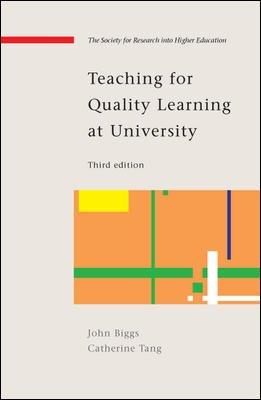
https://ebooknice.com/product/teaching-for-quality-learning-at-

The Society for Research into Higher Education


https://ebooknice.com/product/teaching-for-quality-learning-at-

The Society for Research into Higher Education
John Biggs and Catherine Tang
Current titles include:
Catherine Bargh et al.: University Leadership
Ronald Barnett: Beyond all Reason
Ronald Barnett and Kelly Coate: Engaging the Curriculum in Higher Education
Ronald Barnett: Reshaping the University
Tony Becher and Paul R. Trowler: Academic Tribes and Territories 2/e
Richard Blackwell and Paul Blackmore (eds): Towards Strategic Staff Development in Higher Education
David Boud and Nicky Solomon (eds): Work-based Learning
Tom Bourner et al. (eds): New Directions in Professional Higher Education
John Brennan and Tarla Shah: Managing Quality Higher Education
Anne Brockbank and Ian McGill: Facilitating Reflective Learning in Higher Education 2/e
Ann Brooks and Alison Mackinnon (eds): Gender and the Restructured University
Burton R. Clark: Sustaining Change in Universities
James Cornford and Neil Pollock: Putting the University Online
John Cowan: On Becoming an Innovative University Teacher 2/e
Vaneeta D’Andrea and David Gosling: Improving Teaching and Learning in Higher Education
Sara Delamont, Paul Atkinson and Odette Parry: Supervising the Doctorate 2/e
Sara Delamont and Paul Atkinson: Successful Research Careers
Gerard Delanty: Challenging Knowledge
Chris Duke: Managing the Learning University
Heather Eggins (ed.): Globalization and Reform in Higher Education
Heather Eggins and Ranald Macdonald (eds): The Scholarship of Academic Development
Howard Green and Stuart Powell: Doctoral Study in Contemporary Higher Education
Merle Jacob and Tomas Hellström (eds): The Future of Knowledge Production in the Academy
Peter Knight: Being a Teacher in Higher Education
Peter Knight and Paul Trowler: Departmental Leadership in Higher Education
Peter Knight and Mantz Yorke: Assessment, Learning and Employability
Ray Land: Educational Development
Dina Lewis and Barbara Allan: Virtual Learning Communities
David McConnell: E-Learning Groups and Communities
Ian McNay (ed.): Beyond Mass Higher Education
Louise Morley: Quality and Power in Higher Education
Lynne Pearce: How to Examine a Thesis
Moira Peelo and Terry Wareham (eds): Failing Students in Higher Education
Craig Prichard: Making Managers in Universities and Colleges
Stephen Rowland: The Enquiring University Teacher
Maggi Savin-Baden: Problem-based Learning in Higher Education
Maggi Savin-Baden: Facilitating Problem-based Learning
Maggi Savin-Baden and Claire Howell Major: Foundations of Problem-based Learning
Maggi Savin-Baden and Kay Wilkie: Challenging Research in Problem-based Learning
David Scott et al.: Professional Doctorates
Michael L. Shattock: Managing Successful Universities
Maria Slowey and David Watson: Higher Education and the Lifecourse
Colin Symes and John McIntyre (eds): Working Knowledge
Richard Taylor, Jean Barr and Tom Steele: For a Radical Higher Education
Malcolm Tight: Researching Higher Education
Penny Tinkler and Carolyn Jackson: The Doctoral Examination Process
Melanie Walker: Higher Education Pedagogies
Melanie Walker (ed.): Reconstructing Professionalism in University Teaching
Melanie Walker and Jon Nixon (eds): Reclaiming Universities from a Runaway World
Diana Woodward and Karen Ross: Managing Equal Opportunities in Higher Education
Mantz Yorke and Bernard Longden: Retention and Student Success in Higher Education
3rd edition
John Biggs and Catherine Tang
Open University Press
McGraw-Hill Education
McGraw-Hill House
Shoppenhangers Road
Maidenhead
Berkshire England
SL6 2QL
email: enquiries@openup.co.uk
world wide web: www.openup.co.uk
and Two Penn Plaza, New York, NY 10121–2289, USA
First edition published 1999
Second edition published 2003
This third edition published 2007
Copyright © John Biggs and Catherine Tang 2007
All rights reserved. Except for the quotation of short passages for the purpose of criticism and review, no part of this publication may be reproduced, stored in a retrieval system, or transmitted, in any form or by any means, electronic, mechanical, photocopying, recording or otherwise, without the prior permission of the publisher or a licence from the Copyright Licensing Agency Limited. Details of such licences (for reprographic reproduction) may be obtained from the Copyright Licensing Agency Ltd of Saffron House, 6–10 Kirby Street, London, EC1N 8TS.
A catalogue record of this book is available from the British Library
ISBN-10 0 335 22126 2 (pb)0 335 22127 0 (hb)
ISBN-13: 978 0 335 22126 4 (pb)978 0 335 22127 1 (hb)
Library of Congress Cataloging-in-Publication Data
CIP data has been applied for
Typeset by RefineCatch Limited, Bungay, Suffolk
Printed in Poland by OZ Graf. S.A. www.polskabook.pl
Learning takes place through the active behavior of the student: it is what he does that he learns, not what the teacher does.
Ralph W. Tyler (1949)
If students are to learn desired outcomes in a reasonably effective manner, then the teacher’s fundamental task is to get students to engage in learning activities that are likely to result in their achieving those outcomes. ... It is helpful to remember that what the student does is actually more important in determining what is learned than what the teacher does.
Thomas J. Shuell
(1986)
List of boxesviii
List of figuresx
List of tablesxi
List of tasksxiii
Foreword to original editionxv
Preface to third editionxvii
Acknowledgementsxix
When you have read this bookxx
1The changing scene in university teaching1
2Teaching according to how students learn15
3Setting the stage for effective teaching31
4Using constructive alignment in outcomes-based teaching and learning50
5Designing intended learning outcomes64
6Contexts for effective teaching and learning91
7Teaching/learning activities for declarative knowledge104
8Teaching/learning activities for functioning knowledge135
9Aligning assessment with intended learning outcomes: Principles163
10Assessing and grading declarative knowledge195
11Assessing and grading functioning knowledge217
12Implementing constructive alignment247
13Constructive alignment as implemented: Some examples284
References318 Index331
1.1Outcomes-based education, outcomes based education, outcome-based education and outcome based education: Which do we use?8
4.1How constructive alignment came into being51
5.1From objectives to intended learning outcomes in an engineering course71
6.1Adventure learning in the School of Law95
7.1Course preparation assignments in the teaching of sociology113
7.2Some examples of work-along exercises for a class in accounting of over 200 students116
7.3Dons struggle with stage fright124
7.4How reflection led to assessment being used as a TLA130
8.1A case in environmental education139
8.2An example of teaching/learning activities in acting skills146
8.3How not to encourage creativity147
8.4Designing a problem155
9.1Why measurement model procedures remain176
9.2How Faculty Office suggests final grades should be determined (and the best of British luck!)181
9.3The problem in Box 9.2182
9.4How not to ‘mark’ a dissertation183
10.1Two examples of students’ views on multiple-choice tests198
10.2What do you remember of Thomas Jefferson?204
10.3An ordered-outcome item for physiotherapy students205
10.4A chemistry ordered-outcome item206
10.5A warning from an ancient history essay211
11.1Sample items that went into an assessment portfolio in a course for teachers223